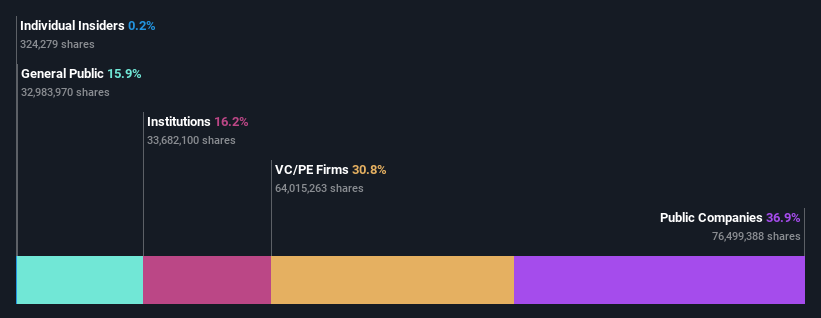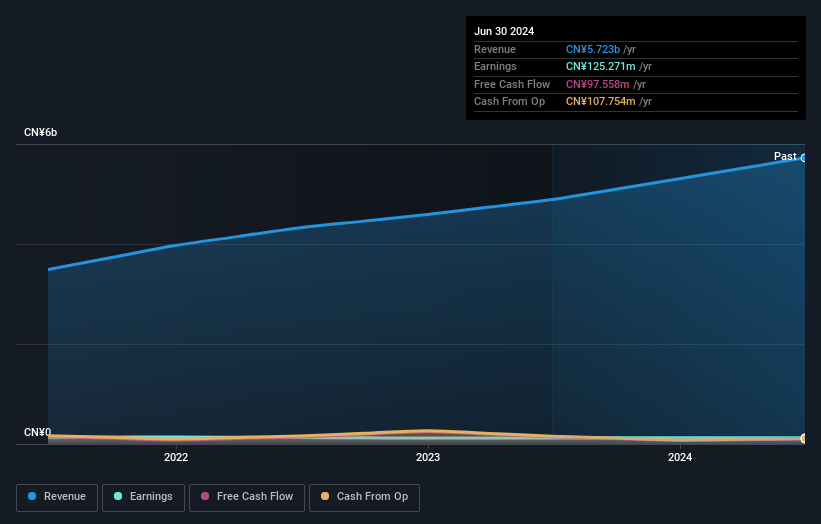- Hong Kong
- /
- Professional Services
- /
- SEHK:2180
ManpowerGroup Greater China Limited's (HKG:2180) market cap dropped HK$104m last week; Public companies bore the brunt

Key Insights
- The considerable ownership by public companies in ManpowerGroup Greater China indicates that they collectively have a greater say in management and business strategy
- A total of 2 investors have a majority stake in the company with 68% ownership
- Institutions own 16% of ManpowerGroup Greater China
Every investor in ManpowerGroup Greater China Limited (HKG:2180) should be aware of the most powerful shareholder groups. The group holding the most number of shares in the company, around 37% to be precise, is public companies. That is, the group stands to benefit the most if the stock rises (or lose the most if there is a downturn).
And following last week's 11% decline in share price, public companies suffered the most losses.
Let's take a closer look to see what the different types of shareholders can tell us about ManpowerGroup Greater China.
View our latest analysis for ManpowerGroup Greater China

What Does The Institutional Ownership Tell Us About ManpowerGroup Greater China?
Institutional investors commonly compare their own returns to the returns of a commonly followed index. So they generally do consider buying larger companies that are included in the relevant benchmark index.
ManpowerGroup Greater China already has institutions on the share registry. Indeed, they own a respectable stake in the company. This suggests some credibility amongst professional investors. But we can't rely on that fact alone since institutions make bad investments sometimes, just like everyone does. It is not uncommon to see a big share price drop if two large institutional investors try to sell out of a stock at the same time. So it is worth checking the past earnings trajectory of ManpowerGroup Greater China, (below). Of course, keep in mind that there are other factors to consider, too.

We note that hedge funds don't have a meaningful investment in ManpowerGroup Greater China. ManpowerGroup Inc. is currently the largest shareholder, with 37% of shares outstanding. CITIC Private Equity Funds Management Co., Ltd. is the second largest shareholder owning 31% of common stock, and Fidelity International Ltd holds about 15% of the company stock.
A more detailed study of the shareholder registry showed us that 2 of the top shareholders have a considerable amount of ownership in the company, via their 68% stake.
While it makes sense to study institutional ownership data for a company, it also makes sense to study analyst sentiments to know which way the wind is blowing. As far as we can tell there isn't analyst coverage of the company, so it is probably flying under the radar.
Insider Ownership Of ManpowerGroup Greater China
While the precise definition of an insider can be subjective, almost everyone considers board members to be insiders. Management ultimately answers to the board. However, it is not uncommon for managers to be executive board members, especially if they are a founder or the CEO.
Most consider insider ownership a positive because it can indicate the board is well aligned with other shareholders. However, on some occasions too much power is concentrated within this group.
Our information suggests that ManpowerGroup Greater China Limited insiders own under 1% of the company. It seems the board members have no more than HK$1.3m worth of shares in the HK$830m company. We generally like to see a board more invested. However it might be worth checking if those insiders have been buying.
General Public Ownership
With a 16% ownership, the general public, mostly comprising of individual investors, have some degree of sway over ManpowerGroup Greater China. While this size of ownership may not be enough to sway a policy decision in their favour, they can still make a collective impact on company policies.
Private Equity Ownership
With an ownership of 31%, private equity firms are in a position to play a role in shaping corporate strategy with a focus on value creation. Some investors might be encouraged by this, since private equity are sometimes able to encourage strategies that help the market see the value in the company. Alternatively, those holders might be exiting the investment after taking it public.
Public Company Ownership
It appears to us that public companies own 37% of ManpowerGroup Greater China. We can't be certain but it is quite possible this is a strategic stake. The businesses may be similar, or work together.
Next Steps:
It's always worth thinking about the different groups who own shares in a company. But to understand ManpowerGroup Greater China better, we need to consider many other factors. Take risks for example - ManpowerGroup Greater China has 1 warning sign we think you should be aware of.
If you would prefer check out another company -- one with potentially superior financials -- then do not miss this free list of interesting companies, backed by strong financial data.
NB: Figures in this article are calculated using data from the last twelve months, which refer to the 12-month period ending on the last date of the month the financial statement is dated. This may not be consistent with full year annual report figures.
New: Manage All Your Stock Portfolios in One Place
We've created the ultimate portfolio companion for stock investors, and it's free.
• Connect an unlimited number of Portfolios and see your total in one currency
• Be alerted to new Warning Signs or Risks via email or mobile
• Track the Fair Value of your stocks
Have feedback on this article? Concerned about the content? Get in touch with us directly. Alternatively, email editorial-team (at) simplywallst.com.
This article by Simply Wall St is general in nature. We provide commentary based on historical data and analyst forecasts only using an unbiased methodology and our articles are not intended to be financial advice. It does not constitute a recommendation to buy or sell any stock, and does not take account of your objectives, or your financial situation. We aim to bring you long-term focused analysis driven by fundamental data. Note that our analysis may not factor in the latest price-sensitive company announcements or qualitative material. Simply Wall St has no position in any stocks mentioned.
About SEHK:2180
ManpowerGroup Greater China
An investment holding company, provides workforce solutions and services in the People’s Republic of China, Hong Kong, Macau, and Taiwan.
Flawless balance sheet and good value.

